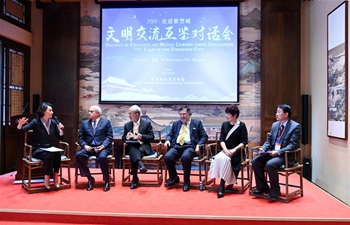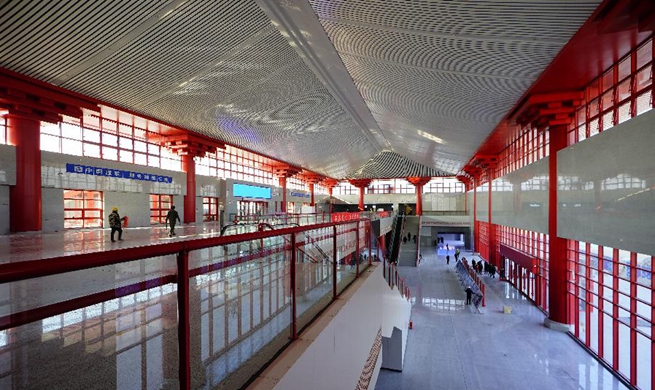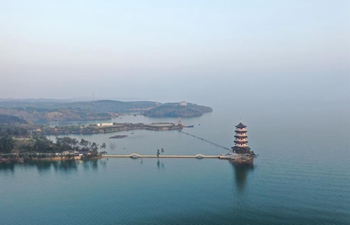by Alessandra Cardone
ROME, Nov. 29 (Xinhua) -- From northern Milan to Rome and down to Sicily's Palermo, large crowds of Italian students on Friday joined the fourth global climate change strike called by the Fridays for Future (FFF) youth movement.
The new round of rallies was attended by secondary school pupils and university students, who called for more incisive climate policies.
Citing the words of UN Secretary-General Antonio Guterres -- "There is no time to lose" -- the movement's Italian organizers had called for days the largest possible participation to the event.
In response, peaceful rallies were registered in at least 139 municipalities across the country, according to both FFF Italy and local media.
In the Italian capital, demonstrators took off from near Termini train station, marched through the historic center, and reached central Piazza del Popolo at around midday.
"We want to keep living, and we want to make ourselves heard before it is too late," one girl shouted through a loudspeaker while the rally started moving.
Among the crowd, 15-year-old Marta from Rome's Virgilio high school told Xinhua that "a turnabout is needed now, and through solid policies... there is nothing else we can do to secure our future."
Marta, who declined to give her surname, added that she has taken part in all the four climate strikes called by Fridays for Future in Italy this year, and with the consent of her parents who shared her worries.
GLOBAL CALL ON LEADERS
The same sense of urgency voiced by the Roman student was palpable among the other young people in the streets.
This fourth global climate strike was intentionally called the week before the annual UN Climate Change Conference (COP25) scheduled in Spanish capital Madrid on Dec. 2-13, FFF Italy explained on its website.
"Our aim at a global level is to put pressure on the political leaders meeting in Spain to take immediate and effective measures to fight the climate crisis," the group wrote.
On its part, the Italian government has been working to have a national climate adaptation plan by the end of the current legislature in 2023, according to a recent declaration of Undersecretary of State for the Environment Ministry Roberto Morassut to Xinhua.
Furthermore, earlier in November, Education Minister Lorenzo Fioramonti announced that Italy would soon add climate change to the science programs implemented in public schools.
Starting next September, when public schools reopen, pupils would have 33 hours (per school year) of study devoted to climate change, adaptation, and sustainable development included in their compulsory curricula, according to Fioramonti.
PIONEER PROJECT IN MILAN
Among various initiatives for climate change adaptation in Italy, one pioneer project involving institutions and professional groups was being carried out in Milan.
Called CLIMAMI, the project was promoted by non-profit Osservatorio Meteorologico Milano Duomo foundation with the local branch of the National Association of Engineers, supported by local and regional authorities, and financed by Foundation Cariplo.
The project was the first of its kind in the country, and aimed at setting up a climatological information system for Milan and various municipalities in its metropolitan area.
"The key message is that professionals -- engineers, architects, hydrology experts, public administrators, etc. -- have to start using climate data in their work routinely, if we want cities to adapt to climate change," Alessandro de Carli with the Milan Association of Engineers told Xinhua.
He spoke on the sidelines of the "General Engineering States in Milan", organized in the northern city on Nov. 29-30.
A first goal was to provide a database of detailed climate data -- with a characterization of specific risks and vulnerabilities of each area and sub-areas within the city, and other indicators -- to public and private stakeholders involved in urban management and planning.
After the first year of activity, the database is ready and would be made available online through the project's website in a matter of weeks, said the engineer.
Alongside, several meetings with professional categories in Milan were organized (and would be in the future) to help them become familiar with these data and their practical use.
"We have been talking to engineers dealing with energy systems of buildings, architects taking care of insulation, professionals working on the hydrologic and hydraulic system, and so on," de Carli explained.
The project's ultimate goal was the creation of "a functional urban climatology for Milan's aerological basin to help make the consideration of local climate pivotal in all public and private work activities," according to the promoters.













